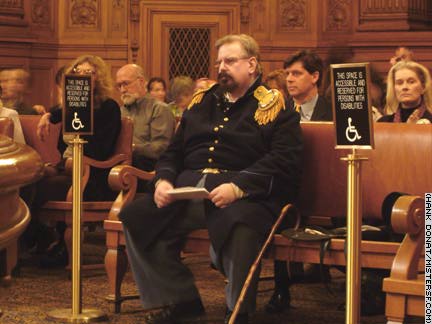
Charles J. Reed waits to
testify before the Board of Supervisors as Emperor Norton in December, 2004.
More >> |
San Francisco rewards
self invention. This is no truer than in the case of English merchant Joshua
Norton, who came to the City from South Africa in 1849 with $40,000. Norton
soon increased his fortune by prospecting real estate. When he went broke
in a failed attempt to corner the rice market a decade later, a distraught
Norton dropped out of sight. Several weeks later, on Sept. 17, 1859, he
reemerged, dressed in a Union Army uniform, brandishing a sword and sporting
a long white plume in his cap. He publicly declared himself Norton I,
Emperor of the United States and Protector of Mexico. San Franciscans
honored Emperor Norton by going along with his new persona. His proclamations,
such as that which disbanded Congress and another ordering the construction
of a bridge between the City and Oakland, were printed in City newspapers.
Some merchants even accepted the money Emperor Norton minted. Arrested for
involuntary treatment of a mental disorder in 1867, Norton was the subject
of a huge outcry of public support. The uproar prompted Police Chief Patrick
Crowley to apologize to the Emperor after ordering His Majesty's release.
Only in legend was Norton sometimes attended by two stray dogs, Bummer
and Lazarus, whose adventures were also followed in City newspapers.
Bummer was poisoned in retaliation for biting a child in 1861. When Lazarus
died two years later, Mark Twain
wrote an epitaph. Norton was a well known figure along Montgomery Street
in the Financial District. His address
was listed as 624 Commercial Street by the
U.S. Census Bureau. Neither the bench located on the sidewalk directly between
608 and 632 Commercial St. nor the site itself are landmarked or officially
recognized except by Mister SF, and now by you. Visit this spot for a quiet
moment to remember Emperor Norton and celebrate San Francisco as a haven
for the self invented. It was Emperor Norton who famously banned the term
"Frisco" when he decreed: "Whoever after due and proper warning shall be
heard to utter the abominable word 'Frisco,' which has no linguistic or
other warrant, shall be deemed guilty of a High Misdemeanor." The tolerance
and affection that San Franciscans felt for Norton were expressed when 10,000
people attended his funeral in 1880.
Detail
I |
